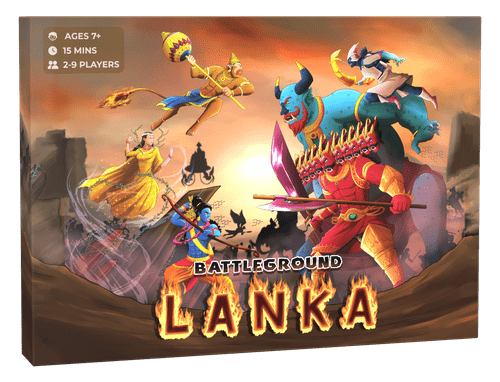Description
Objective
Battleground Lanka is a team-based strategy game. Players take turns attacking their opponents. A team is declared the winner when all players on opposing teams have been eliminated.
Cards
There are 3 types of cards in the game: Character Cards, Action Cards and Health Trackers.
Character Cards
Each character belongs to one of 3 teams, indicated by the symbol on the upper-right hand corner of the character card:
• Team Orange
• Team Purple
• Team Neutral aka "double agent"
Action Cards
There are 6 categories of action cards:
• Attack
• Defense
• Health
• Theft
• Luck
• Power
Players and Setup
The game can be played with 2 - 9 players. Players choose characters and join their respective teams.
For Odd Number of Players: Choose an equal number of characters from Orange & Purple, plus the Neutral character.
For Even Number of Players: Choose an equal number of characters from Orange & Purple.
Choosing Character Cards: Players should be seated in a circle. Each player chooses a character, keeping in mind that adjacent players cannot be on the same team. Place your character card faceup for everyone to see, overlapping the Health Tracker
Distributing Action Cards: Before the game begins, Action Cards are shuffled and the deck is placed facedown. Each player is dealt 5 cards facedown. Players pick up and view their cards, but may not show them to others.
Gameplay
The game begins with the youngest player at the table.
On each turn, in the order stated below, players shall:
• Draw 2 cards from the deck and add them to their hand. Players may also choose to forego drawing cards on any turn.
• Play as many cards as they wish (zero or more) from their hand. Only 1 attack turn card can be played per turn. Players may play other types of cards before and/or after an attack. Played cards are placed faceup in a common discard pile.
• End their turn and discard any unwanted cards (see below)
Ending your turn
Players may end their turn at any time, even without playing a single card. However, at the time they end their turn, they must discard any cards of their choice until they hold at most 5 cards.
Holding More Than 5 Cards
Players may end up holding more than 5 cards outside their turn. This is permitted. Example: A player holding 5 cards draws a 6th card when another player plays brahma [Fortune].
Managing the deck: If the deck runs out, shuffle the discard pile and place the cards facedown. Continue playing.
Attacking
Every attack card has an associated attack damage and attack weapon. Players play attack cards to deal damage to their opponents. On each turn, a player may play a maximum of 1 attack card.
Defending
When attacked, a player can defend themselves by playing a defense card in real-time, out-of-turn. Each defense card includes the attack weapon, that it can defend against. Some power cards or Superpowers can also assist in defending.
Losing and Restoring Health
If players are unable to defend an attack, they lose health equal to the damage, included on the attack card. Players can restore health by playing a health card during their turn to heal themselves or other players. (Illustration to the right shows how to track health)
Player Revival: At the time that a player’s health goes to zero, any player may play sanjeevani [Herbs] in real-time, out-of-turn, to revive this player back to 1 health.
Player Elimination: If a player reaches zero health and isn’t revived in real-time, they are eliminated from the game and must flip over their character card. The attacking player receives all in-hand cards from the defeated player.
Stealing
Players use theft cards to strategically weaken their opponents. Note: When stealing from another player’s in-hand cards, you must choose that card facedown.
Superpowers
Each character has a unique skill, or Superpower, listed on their character card. Superpowers supersede Action Cards. Example: The Superpower of rama [Protector] allows players to enhance jatayu [Shield] as a defense against either attack weapon.
Power Cards
Players play power cards during their turn by placing them in front of their own or another player’s character card. Power cards supersede Superpowers and Action Cards. Example: If a player has lakshman rekha [Palisade] placed next to them, any attack on the player must first be evaluated against this power.
Chaos Mode
Once you’re familiar with the regular gameplay, try out Chaos Mode for a faster-paced experience. It’s most fun with 5+ players. The group must decide on this mode before the game begins.
• Attacks: every player may play up to 2 attack cards in a turn
• Defense: any player may play a defense card in real-time, outside their turn, to protect the player being attacked. Note: If someone else defends a player, Superpowers of neither the player being attacked, nor the one defending the attack apply.
• Revivals: Each player is entitled to 1 revival per game. That is, when players reach zero health, they revive back to full health in real-time.


Comments (0)